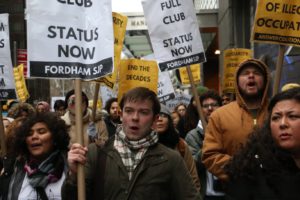 On Jan. 23, 120 people protested Fordham University’s recent decision to ban Students for Justice in Palestine from organizing on its Lincoln Center campus. The crowd consisted of Fordham students and faculty, and activists from various SJP chapters, SJP NYC, Jewish Voices for Peace, Samidoun, ANSWER Coalition, and the Party for Socialism and Liberation.
On Jan. 23, 120 people protested Fordham University’s recent decision to ban Students for Justice in Palestine from organizing on its Lincoln Center campus. The crowd consisted of Fordham students and faculty, and activists from various SJP chapters, SJP NYC, Jewish Voices for Peace, Samidoun, ANSWER Coalition, and the Party for Socialism and Liberation.
This was the latest activity in an ongoing struggle that has become a key focus of the Palestine solidarity movement. The students have received the backing of civil rights groups, including the prestigious Center for Constitutional Rights. An online petition in solidarity with Fordham SJP has been signed by dozens of Palestine solidarity groups, professors, and students from other campuses.
SJP is on campuses in the United States, Canada and New Zealand. Its purpose is to shed light on the Israel-Palestinian conflict through a lens more sympathetic to the Palestinian struggle, a view rarely presented in mainstream media.
SJP applied for club status at Fordham in November 2015. After being approved by the student government a year later, their application was vetoed by Dean of Students Keith Eldredge on Dec. 22. In an open letter to SJP, Eldredge said he “cannot support an organization whose sole purpose is advocating political goals of a specific group, and against a specific country.” This is the first time Eldredge has used veto power, and many believe it was a blatant political move to prevent a Palestinian voice on campus.
Many found his response inadequate and hypocritical. There are in fact plenty of other student organizations who can fit this description and do not face the same scrutiny.
Fordham ‘violates free speech’
On Jan. 17, the Center for Constitutional Rights and Palestine Legal issued a joint letter to the collage saying its banning of SJP “violates free speech and association principles, the University’s commitment to protect free inquiry, and could give rise to a violation of Title VI of the Civil Rights Act.” The letter also backed the students demands that the university “immediately approve SJP, apologize, and reaffirm Fordham’s commitment to free speech, association rights and academic freedom.”
Also opposing Fordham’s decision was the National Coalition Against Censorship and the Foundation for Individual Rights in Education. Ari Cohn, director of the latter group’s individual rights defense program, said that SJP’s “orient[ation] toward advocating a specific political viewpoint is not out of the ordinary, and student organizations at every campus across the country do just that.”
Sapphira Lurie, a student organizing the SJP chapter, said, “Dean Eldredge denied SJPs club request because he believes that advocating for the political goals of a specific group and a club’s discussion of a complex issue like the Israel-Palestine conflict would present a barrier to campus dialogue. First, there are several clubs on campus that advocate for specific politics—the College Republicans and Democrats, for example—with certain politics and criticisms of government policies, so this objection is totally dishonest.
“Second, there is no better place than a university to deal with ‘complex’ issues. Why should our university be a place where it is too difficult to allow student-led learning about these types of issues? And further, how can we have ‘open dialogue’ on our campus when the administration suppresses actual student voices? That is not any sort of open dialogue. It is a monologue.”
While Eldredge’s veto power is a new precedent, difficulties in setting up SJP chapters are common. Leena Widdi from SJP NYC explained, “Almost every SJP chapter in the country has experienced institutional repression in one way or another. For some chapters, it is more blatant and aggressive, like at Fordham, but for others it comes in the form of extra security or unprecedented bureaucratic procedures. Every SJP chapter in the CUNY system, for example, was subjected to a 6-month long investigation into anti-Semitism, based largely on complaints from students who disagreed politically with SJPs actions. No other student group would ever be subjected to such procedures for simply having political opinions that are controversial to some.”
‘We’re not going to cave in!’
At the Jan. 23 demonstration, students passed out informational flyers with a positive response from people passing by. Ahmad Awad, who would have been president of the club, exclaimed, “We’re refusing to let this go to waste, push over and die out. We’re going to continue to garner support and push moving forward.” Representatives from activist groups spoke and led the crowd in chants such as, “When student rights are under attack, what do we do? Stand up fight back!”
“I feel public opinion is really turning as people are finding out the truth of what has been going on in Palestine. Organizations such as SJP are vital in getting this truth out. The actions of Fordham University are a clear suppression of student voices,” Rachel Silang, Fordham alumni and member of the Party for Socialism and Liberation explained. “Anyone interested in social justice should be rallying around this cause.”
Students plan to keep calling actions and are determined to have SJP fully recognized by Fordham University. How the school administration will respond is yet to be determined.






